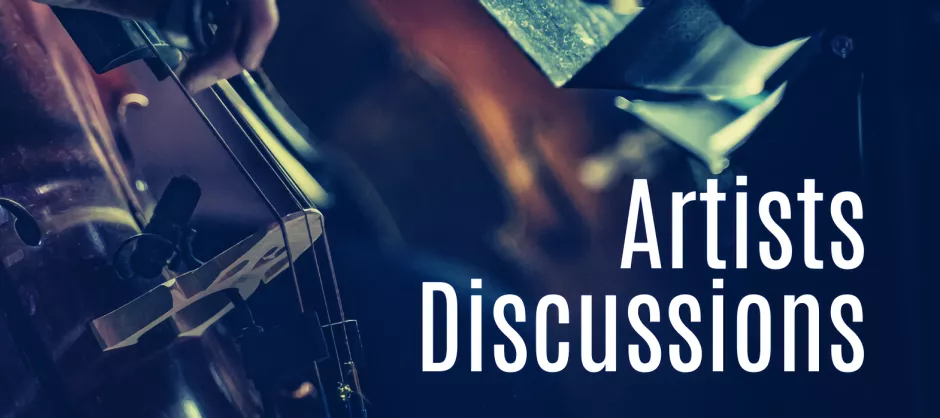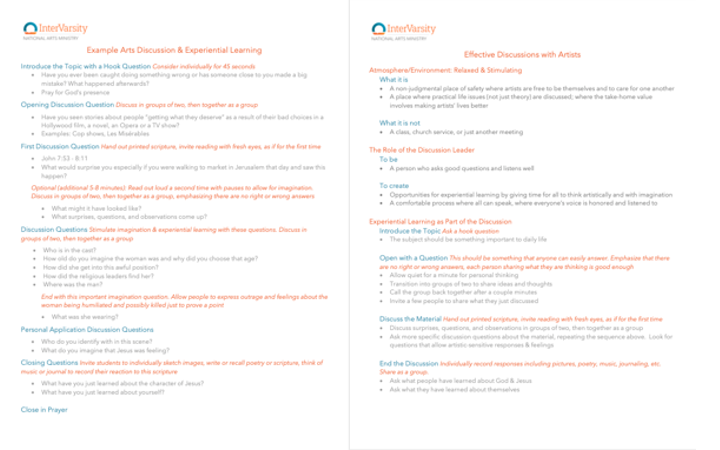
Leading Effective Discussions with Artists
Are you hoping to lead more effective discussions, particularly with artists and art students? This short guide shares some tips and best practices for leading more engaging, interactive discussions that will serve whomever you lead, but especially the artists and art students in your community.
Effective Discussions with Artists
Atmosphere/Environment: Relaxed & Stimulating
What it is
- A non-judgmental place of safety where artists are free to be themselves and to care for one another
- A place where practical life issues (not just theory) are discussed; where the take-home value involves making artists’ lives better
What it is not
- A class, church service, or just another meeting
The Role of the Discussion Leader
To be
- A person who asks good questions and listens well
To create
- Opportunities for experiential learning by giving time for all to think artistically and with imagination
- A comfortable process where all can speak, where everyone’s voice is honored and listened to
Experiential Learning as Part of the Discussion
Introduce the Topic Ask a hook question
- The subject should be something important to daily life
Open with a Question This should be something that anyone can easily answer. Emphasize that there are no right or wrong answers, each person sharing what they are thinking is good enough
- Allow quiet for a minute for personal thinking
- Transition into groups of two to share ideas and thoughts
- Call the group back together after a couple of minutes
- Invite a few people to share what they just discussed
Discuss the Material Hand out printed scripture, invite reading with fresh eyes, as if for the first time
- Discuss surprises, questions, and observations in groups of two, then together as a group
- Ask more specific discussion questions about the material, repeating the sequence above. Look for questions that allow artistic-sensitive responses & feelings
End the Discussion Individually record responses including pictures, poetry, music, journaling, etc. Share as a group.
- Ask what people have learned about God & Jesus
- Ask what they have learned about themselves
Example Arts Discussion & Experiential Learning
Introduce the Topic with a Hook Question Consider individually for 45 seconds
- Have you ever been caught doing something wrong or has someone close to you made a big mistake? What happened afterward?
- Pray for God’s presence
Opening Discussion Question Discuss in groups of two, then together as a group
- Have you seen stories about people “getting what they deserve” as a result of their bad choices in a Hollywood film, a novel, an Opera, or a TV show?
- Examples: Cop shows, Les Misérables
First Discussion Question Hand out printed scripture, invite reading with fresh eyes, as if for the first time
- John 7:53 - 8:11
- What would surprise you especially if you were walking to the market in Jerusalem that day and saw this happen?
Optional (additional 5-8 minutes): Read out loud a second time with pauses to allow for imagination. Discuss in groups of two, then together as a group, emphasizing there are no right or wrong answers
- What might it have looked like?
- What surprises, questions and observations come up?
Discussion Questions Stimulate imagination & experiential learning with these questions. Discuss in groups of two, then together as a group
- Who is in the cast?
- How old do you imagine the woman was and why did you choose that age?
- How did she get into this awful position?
- How did the religious leaders find her?
- Where was the man?
End with this important imagination question. Allow people to express outrage and feelings about the woman being humiliated and possibly killed just to prove a point
- What was she wearing?
Personal Application Discussion Questions
- Who do you identify within this scene?
- What do you imagine that Jesus was feeling?
Closing Questions Invite students to individually sketch images, write or recall poetry or scripture, think of music or journal to record their reaction to this scripture
- What have you just learned about the character of Jesus?
- What have you just learned about yourself?
Close in Prayer
For more information and resources, visit InterVarsity Arts Ministry.

